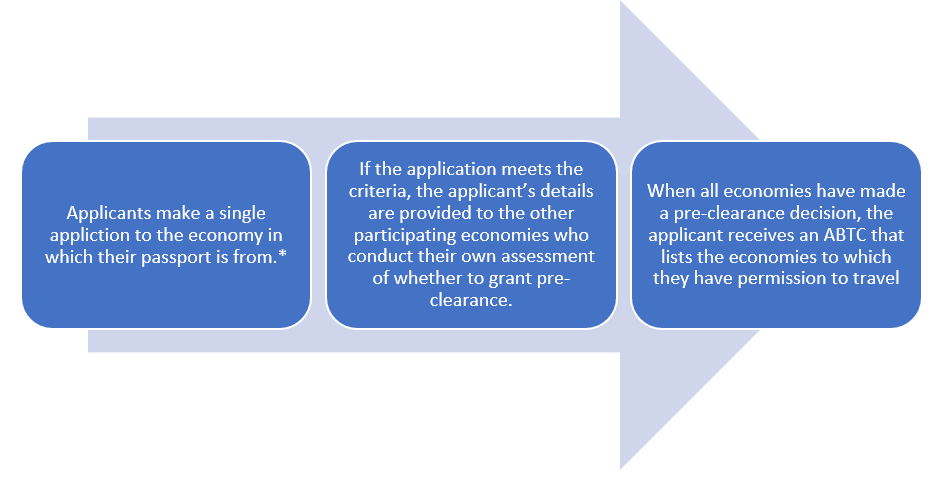The Application Process
*In the case of Hong Kong, the applicant must apply to the economy in which they hold PR.
Participating Economies and Entry Requirements
| Country | Length of Stay | Travel Purpose | Ports of Entry |
| Australia | 90 days | Can travel for tourism and business | Can enter at all ports of entry |
| Brunei Darussalam | 90 days | Can travel for tourism and business | Designated ports of entry only |
| Canada | Designated ports of entry only | ||
| Chile | 90 days | Can travel for tourism and business | Can enter at all ports of entry |
| China | 60 days | Business purposes only | Can enter at all ports of entry |
| Hong Kong, China | 60 days | Can travel for tourism and business | Can enter at all ports of entry |
| Indonesia | 60 days | Business purposes only | Designated ports of entry only |
| Japan | 90 days | Business purposes only | Can enter at all ports of entry |
| Korea | 90 days | Can travel for tourism and business | Can enter at all ports of entry |
| Malaysia | 90 days | Business purposes only | Designated ports of entry only |
| Mexico | 90 days | Business purposes only | Can enter at all ports of entry |
| New Zealand | 90 days | Business purposes only | Can enter at all ports of entry |
| Papua New Guinea | 60 days | Can travel for tourism and business | Can enter at all ports of entry |
| Peru | 90 days | Business purposes only | Can enter at all ports of entry |
| The Philippines | 90 days | Business purposes only | Can enter at all ports of entry |
| Russia | 90 days | Business purposes only | Can enter at all ports of entry |
| Singapore | 60 days | Business purposes only | Can enter at all ports of entry |
| Chinese Taipei | 90 days | Business purposes only | Can enter at all ports of entry |
| Taipei | 90 days | Business purposes only | Can enter at all ports of entry |
| Thailand | 90 days | Can travel for tourism and business | Can enter at all ports of entry |
| United States | Designated ports of entry only | ||
| Vietnam | 90 days | Can enter at all ports of entry |
Who is eligible for an Asia-Pacific Economic Cooperation (APEC) Business Travel Card (ABTC)
You can apply for an ABTC if you:
- travel frequently to an APEC economy (other than Australia or your place of residence) for business purposes
- have not been convicted of a criminal offence
To be eligible, you must be one of the following:
- Chief Executive Officer (CEO), Chief Financial Officer (CFO) or regional or country head of a registered business entity
- an owner or director of a registered business entity
- a board member of a registered business entity
- CEO or CFO of an Australian-based business peak body
- a Vice President, Executive, Director, Senior Manager or similar
- an employee of a registered business entity nominated by the CEO, CFO, regional head, owner or director of the organisation. See the Pro-forma nomination letter (20KB PDF)
- a senior government official (defined as a member of the Australian Public Service who is at the Senior Executive Service level or above, or a state/territory equivalent)
Your business entity or Australian-based peak business body must be engaged in international trade or investment between APEC economies. See Business assessment below for details. If you are living outside Australia, you must have permission to live and work within this economy of residence. Applicants may be required to provide evidence of their work and residence permit with their application.
Business assessment
DHA will consider a business to be engaged in trade or investment between APEC economies if the business:
- has received an Export Market Development Grant from Austrade in the past five years
- has been a finalist in the Australian Export Awards in the past five years
- is listed on the current Forbes Global 2000 business list
- is an accredited Australian Trusted Trader
DHA might also consider a business to be engaged in trade or investment activities between APEC economies, provided the business is lawfully registered in the economy in which it is operating and is either:
- trading goods, services or conducting investment activities between APEC economies, or
- if the business is a start-up operation
The application must provide supporting evidence.
Supporting evidence for a lawfully registered business (in the economy in which it is operating) might include:
- an Australian or overseas business registration certificate that can be verified with the issuing authority
- an Australian Business Number (if applicable)
- registration with the Australian Securities and Investment Commission (if applicable)
Supporting evidence for a business that is trading goods, services or conducting investment activities between APEC economies might include:
- publicly available product/service information that identifies goods or services that the business trades internationally
- reputable business clients who receive a good/service from the business
- a copy of a lease or other document evidencing an address and location of an office of the business in another APEC economy
- a business licence or other document evidencing approval to establish and operate an office in an APEC economy
Supporting evidence for a business that is a start up operation, might include:
- clear evidence of viability
- sound business planning
- market research
- product/s or services to be traded
- reputable business clients
- news articles
- financial or other documents that might reasonably attest to the bonafide establishment of a start-up operation
- a letter of support from a recognised business peak body where a member who might not otherwise have available evidence that they are a start-up operation.
Related:
- How to extend your stay in Australia on a Visitor visa?
- Reasons for Australian Visitor Visa Refusal
- Australia Visa Waivers and Refunds
- Australia and New Zealand Safe Travel Zone
- Permissible Activities on Visitor Visas
- Bringing Family Members to Australia
- Visitor Visa options for Parents after COVID-19
- Australian borders likely to open in beginning of 2022
- Australia’s four-phase plan to open its border





